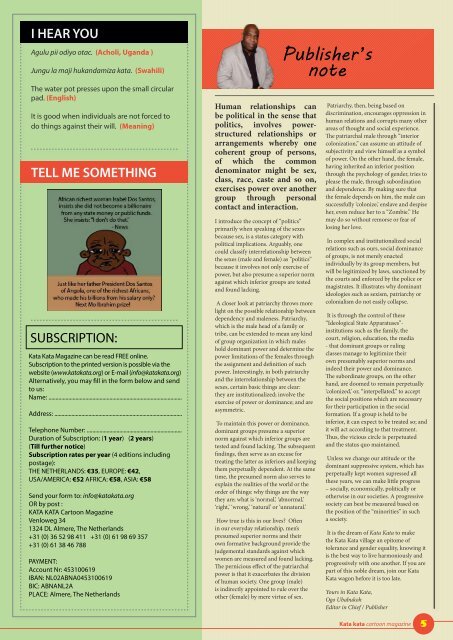2016 EDITION vol.3 issue 12 DIGITAL
Create successful ePaper yourself
Turn your PDF publications into a flip-book with our unique Google optimized e-Paper software.
I HEAR YOU<br />
Agulu pii odiyo otac. (Acholi, Uganda )<br />
Jungu la maji hukandamiza kata. (Swahili)<br />
The water pot presses upon the small circular<br />
pad. (English)<br />
It is good when individuals are not forced to<br />
do things against their will. (Meaning)<br />
TELL ME SOMETHING<br />
SUBSCRIPTION:<br />
Kata Kata Magazine can be read FREE online.<br />
Subscription to the printed version is possible via the<br />
website (www.katakata.org) or E-mail (info@katakata.org)<br />
Alternatively, you may fill in the form below and send<br />
to us:<br />
Name: ..............................................................................................<br />
Address: ..........................................................................................<br />
Telephone Number: ...................................................................<br />
Duration of Subscription: (1 year) (2 years)<br />
(Till further notice)<br />
Subscription rates per year (4 editions including<br />
postage):<br />
THE NETHERLANDS: €35, EUROPE: €42,<br />
USA/AMERICA: €52 AFRICA: €58, ASIA: €58<br />
Send your form to: info@katakata.org<br />
OR by post :<br />
KATA KATA Cartoon Magazine<br />
Venloweg 34<br />
1324 DL Almere, The Netherlands<br />
+31 (0) 36 52 98 411 +31 (0) 61 98 69 357<br />
+31 (0) 61 38 46 788<br />
PAYMENT:<br />
Account Nr: 453100619<br />
IBAN: NL02ABNA0453100619<br />
BIC: ABNANL2A<br />
PLACE: Almere, The Netherlands<br />
Human relationships can<br />
be political in the sense that<br />
politics, involves powerstructured<br />
relationships or<br />
arrangements whereby one<br />
coherent group of persons,<br />
of which the common<br />
denominator might be sex,<br />
class, race, caste and so on,<br />
exercises power over another<br />
group through personal<br />
contact and interaction.<br />
I introduce the concept of “politics”<br />
primarily when speaking of the sexes<br />
because sex, is a status category with<br />
political implications. Arguably, one<br />
could classify interrelationship between<br />
the sexes (male and female) as “politics”<br />
because it involves not only exercise of<br />
power, but also presume a superior norm<br />
against which inferior groups are tested<br />
and found lacking.<br />
A closer look at patriarchy throws more<br />
light on the possible relationship between<br />
dependency and maleness. Patriarchy,<br />
which is the male head of a family or<br />
tribe, can be extended to mean any kind<br />
of group organization in which males<br />
hold dominant power and determine the<br />
power limitations of the females through<br />
the assignment and definition of such<br />
power. Interestingly, in both patriarchy<br />
and the interrelationship between the<br />
sexes, certain basic things are clear:<br />
they are institutionalized; involve the<br />
exercise of power or dominance; and are<br />
asymmetric.<br />
To maintain this power or dominance,<br />
dominant groups presume a superior<br />
norm against which inferior groups are<br />
tested and found lacking. The subsequent<br />
findings, then serve as an excuse for<br />
treating the latter as inferiors and keeping<br />
them perpetually dependent. At the same<br />
time, the presumed norm also serves to<br />
explain the realities of the world or the<br />
order of things: why things are the way<br />
they are; what is ‘normal,’ ‘abnormal,’<br />
‘right,’ ‘wrong,’ ‘natural’ or ‘unnatural.’<br />
How true is this in our lives? Often<br />
in our everyday relationship, men’s<br />
presumed superior norms and their<br />
own formative background provide the<br />
judgemental standards against which<br />
women are measured and found lacking.<br />
The pernicious effect of the patriarchal<br />
power is that it exacerbates the division<br />
of human society. One group (male)<br />
is indirectly appointed to rule over the<br />
other (female) by mere virtue of sex.<br />
Publisher’s<br />
note<br />
Patriarchy, then, being based on<br />
discrimination, encourages oppression in<br />
human relations and corrupts many other<br />
areas of thought and social experience.<br />
The patriarchal male through “interior<br />
colonization,” can assume an attitude of<br />
subjectivity and view himself as a symbol<br />
of power. On the other hand, the female,<br />
having inherited an inferior position<br />
through the psychology of gender, tries to<br />
please the male, through subordination<br />
and dependence. By making sure that<br />
the female depends on him, the male can<br />
successfully ‘colonize,’ enslave and despise<br />
her, even reduce her to a “Zombie.” He<br />
may do so without remorse or fear of<br />
losing her love.<br />
In complex and institutionalized social<br />
relations such as ours, social dominance<br />
of groups, is not merely enacted<br />
individually by its group members, but<br />
will be legitimized by laws, sanctioned by<br />
the courts and enforced by the police or<br />
magistrates. It illustrates why dominant<br />
ideologies such as sexism, patriarchy or<br />
colonialism do not easily collapse.<br />
It is through the control of these<br />
“Ideological State Apparatuses”-<br />
institutions such as the family, the<br />
court, religion, education, the media<br />
- that dominant groups or ruling<br />
classes manage to legitimize their<br />
own presumably superior norms and<br />
indeed their power and dominance.<br />
The subordinate groups, on the other<br />
hand, are doomed to remain perpetually<br />
‘colonized,’ or, “interpellated,” to accept<br />
the social positions which are necessary<br />
for their participation in the social<br />
formation. If a group is held to be<br />
inferior, it can expect to be treated so; and<br />
it will act according to that treatment.<br />
Thus, the vicious circle is perpetuated<br />
and the status quo maintained.<br />
Unless we change our attitude or the<br />
dominant suppressive system, which has<br />
perpetually kept women supressed all<br />
these years, we can make little progress<br />
– socially, economically, politically or<br />
otherwise in our societies. A progressive<br />
society can best be measured based on<br />
the position of the “minorities” in such<br />
a society.<br />
It is the dream of Kata Kata to make<br />
the Kata Kata village an epitome of<br />
tolerance and gender equality, knowing it<br />
is the best way to live harmoniously and<br />
progressively with one another. If you are<br />
part of this noble dream, join our Kata<br />
Kata wagon before it is too late.<br />
Yours in Kata Kata,<br />
Ogo Ubabukoh<br />
Editor in Chief / Publisher<br />
Kata kata cartoon magazine<br />
5

















